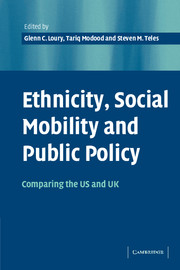Book contents
- Frontmatter
- Contents
- List of figures
- List of tables
- List of contributors
- Acknowledgements
- Introduction
- Part I Historical overviews
- 1 Ruling an empire, governing a multinational state: the impact of Britain's historical legacy on the ethno-racial regime
- 2 American diversity and the 2000 census
- 3 Four modes of ethno-somatic stratification: the experience of Blacks in Europe and the Americas
- Part II Informal social networks
- Part III Formal structures
- Part IV Political institutions and processes
- Part V Normative analysis
- Author index
- Subject index
- References
1 - Ruling an empire, governing a multinational state: the impact of Britain's historical legacy on the ethno-racial regime
Published online by Cambridge University Press: 22 September 2009
- Frontmatter
- Contents
- List of figures
- List of tables
- List of contributors
- Acknowledgements
- Introduction
- Part I Historical overviews
- 1 Ruling an empire, governing a multinational state: the impact of Britain's historical legacy on the ethno-racial regime
- 2 American diversity and the 2000 census
- 3 Four modes of ethno-somatic stratification: the experience of Blacks in Europe and the Americas
- Part II Informal social networks
- Part III Formal structures
- Part IV Political institutions and processes
- Part V Normative analysis
- Author index
- Subject index
- References
Summary
Introduction
The ethno-racial regime in Britain is discussed usually in terms of the impact of the end of empire and the post-1945 immigration of people, mostly in possession of British citizenship, from the New Commonwealth and Pakistan. This chapter extends the discussion to bring into simultaneous consideration the formation of the multinational state and the light this can shed on the management of national/ethnic relations within the domestic sphere. It is the articulation of these two realms, those of empire and that of the multinational state, which will be explored to reveal the extent to which common practices inform both, and the specificity of each which explains the particularities of the British case.
Much of the literature about the post-1945 immigrants and their British-born children argues that as populations they are distinguished by their experiences of colonialism and subsequent related experiences after migration to the imperial centre. It is assumed, quite correctly, that this history of colonial relations has been important in developing British attitudes to ethno-racial differentiation. I am not challenging these fundamental points but I am arguing against any reduction of this history to a matter of white/black relations. A major reason for arguing against this is that in Ireland empire and multinational state formation intermeshed and produced a history which both explains the centre and the periphery and had an impact on the developing ethno-racial regime.
- Type
- Chapter
- Information
- Ethnicity, Social Mobility, and Public PolicyComparing the USA and UK, pp. 21 - 49Publisher: Cambridge University PressPrint publication year: 2005
References
- 19
- Cited by



